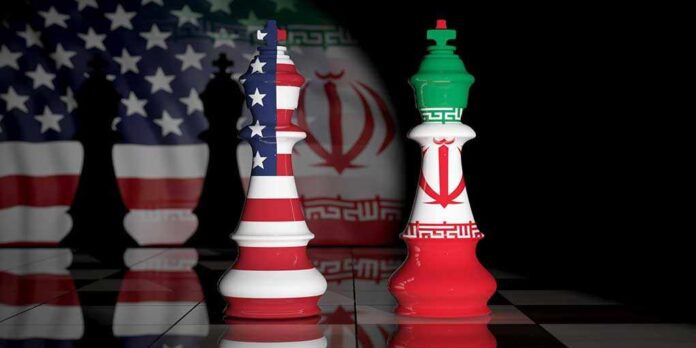Iran’s Supreme Leader Ayatollah Ali Khamenei has firmly rejected former President Donald Trump’s proposal for direct nuclear talks, dismissing the American approach as deceptive while tensions between the two nations continue to escalate.
Quick Takes
- Trump sent a letter to Iran’s Supreme Leader offering two options: reaching a peace deal or facing military action
- Iran officially responded through Oman, rejecting direct negotiations under “maximum pressure” and military threats
- Khamenei characterized Trump’s proposal as “deception,” claiming such talks aim to exert dominance rather than resolve issues
- The U.S. continues to pursue a “maximum pressure” strategy with sanctions targeting Iran’s energy sector
- International concerns grow as reports indicate Iran is expanding its enriched uranium stockpile
Trump’s Peace Proposal and Veiled Threats
Former President Donald Trump has attempted to engage Iran in renewed nuclear negotiations through a letter addressed directly to Supreme Leader Ayatollah Ali Khamenei. The communication laid out two distinct paths forward: either reach a diplomatic agreement regarding Iran’s nuclear program or face potential military consequences. Trump’s special envoy Steve Witkoff has emphasized the administration’s preference for a peaceful resolution, stating, “We don’t need to solve everything militarily,” while acknowledging the serious concerns about Iran’s nuclear capabilities.
The proposal suggested potential benefits for Iran, particularly regarding oil exports, if the country agreed to abandon any pursuits of nuclear weapons. However, National Security Adviser Mike Waltz reinforced the administration’s hard stance by declaring that “all options are on the table” should Iran refuse to cooperate. This dual approach of diplomatic outreach backed by military posturing reflects the continuation of Trump’s “maximum pressure” strategy first implemented when he withdrew from the 2015 nuclear agreement and reimposed sanctions on Iran.
Presidents Vladimir Putin and Donald Trump spoke by phone for more than two hours, with both the Kremlin and the White House describing the conversation as "positive."
Putin backed Trump’s proposal for a 30-day mutual moratorium on attacks against energy infrastructure in… pic.twitter.com/THZdRoXvWC
— CGTN Europe (@CGTNEurope) March 18, 2025
Iran’s Firm Rejection
Iran has categorically rejected direct negotiations with the United States under the current circumstances. Foreign Minister Abbas Araghchi delivered Iran’s official response through Oman, a long-standing mediator between the two nations. While the specific details of the response remain confidential, Araghchi made Iran’s position clear: “Our policy remains not to negotiate directly (with Washington) under ‘maximum pressure’ and the threat of military action, but indirect negotiations, such as those that took place in the past, can continue.”
“The official response comprises a letter wherein our viewpoints regarding the status quo and Mr. Trump’s letter have been fully laid out and relayed to the other side,” stated Minister Araghchi.
Supreme Leader Khamenei was even more direct in his assessment, characterizing Trump’s proposal as “a deception” and expressing fundamental distrust of American intentions. In public remarks, Khamenei explained his rejection of direct talks by stating, “Such negotiations aren’t aimed at solving issues. Their aim is to exert their dominance.” This response highlights the deep-rooted suspicion that continues to define Iran’s approach to diplomacy with the United States, particularly after America’s unilateral withdrawal from the 2015 nuclear deal.
According to a 2 February report by Haaretz:
US President Donald Trump and Israeli Prime Minister Benjamin Netanyahu are set to announce progress in negotiations on a peace agreement between Israel and Saudi Arabia following their meeting in Washington on Tuesday.
The Trump… pic.twitter.com/4T72ZxrqKy
— The Cradle (@TheCradleMedia) February 2, 2025
Escalating Nuclear Concerns
The diplomatic impasse comes amid growing international alarm about Iran’s nuclear activities. A recent report from the International Atomic Energy Agency indicates that Iran continues to expand its stockpile of enriched uranium, moving closer to potential weapons-grade material. While Iran maintains its nuclear program is solely for peaceful purposes, the United States and Israel have expressed serious doubts about these claims and have reportedly considered military options to prevent Iran from acquiring nuclear weapons.
“Hopefully, we will have a peace deal. I’m just saying I’d rather see a peace deal than the other. But the other will solve the problem,” warned Donald Trump, indicating the serious consequences Iran might face without an agreement.
The standoff represents a critical juncture in Middle East security dynamics. Since Trump’s 2018 decision to withdraw from the Joint Comprehensive Plan of Action (JCPOA), Iran has progressively rolled back its commitments under the agreement. Tensions have remained high, with occasional flare-ups threatening broader regional stability. While Iran has indicated openness to indirect negotiations through intermediaries, the prospects for a comprehensive resolution appear dim as both sides maintain their hardened positions.
Sources:
- https://www.newsweek.com/trump-witkoff-iran-nuclear-waltz-2049388
- https://timesofindia.indiatimes.com/world/middle-east/not-to-negotiate-directly-iran-responds-to-trumps-nuclear-talks-proposal/articleshow/119628898.cms
- https://www.theepochtimes.com/world/iran-responds-to-trumps-letter-offering-to-negotiate-a-new-nuclear-deal-5832479











